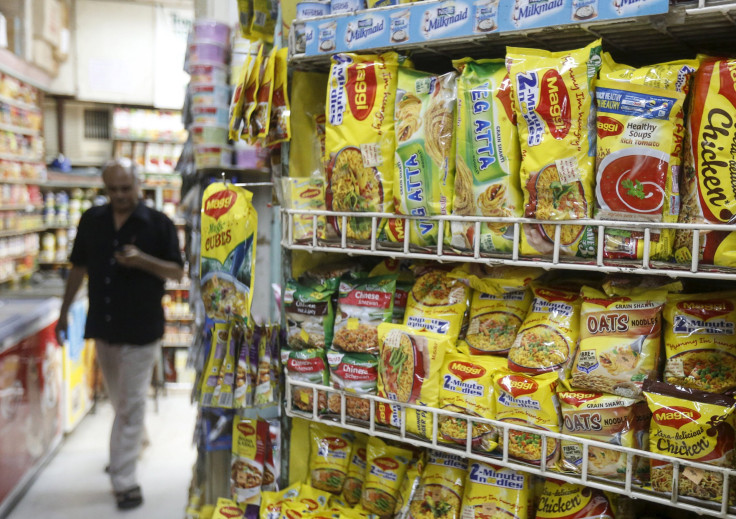After Maggi Noodle Recall, Many In India Await Quick Resolution And The Return Of Their Favorite Comfort Food

BANGALORE -- Ashu Garg is more than 1,600 miles from her home in Punjab, pursuing a postgraduate degree in prosthodontics -- and she misses her Maggi bad. The store she visits near her hostel no longer stocks the instant noodles.
Maggi, the make-in-two-minutes noodles from Swiss food company Nestlé, is hugely popular in middle-class households across India. And one week after federal food safety authorities ordered the packaged noodles off the shelves after finding they contained higher-than-permissible levels of lead and elevated levels of monosodium glutamate (MSG), many Indians -- especially students like Garg -- are awaiting the return of their favorite comfort food.
Nestlé has recalled its products, but the company said its own tests showed the noodles were safe for consumption and met India’s rules, in a statement on June 5. On Thursday, Nestlé went to court to combat what it termed "issues of interpretation" of India's food safety rules regarding a ban of its product in the western state of Maharashtra as well as the federal food safety authority's order. It has also challenged the federal recall by India's Food Safety Standards Authority.
About 27,000 metric tons of various forms of Maggi noodle products are being removed from stores and warehouses, according to Nestlé.
“We will do everything it takes and are fully engaged with the authorities, to clarify the situation to have Maggi Noodles back on the shelves at the earliest.” Paul Bulcke, Nestlé’s CEO said in the statement.
For people like Garg, Maggi isn’t an ideal meal, but it often makes the difference between rushing to class hungry or getting a quick breakfast.
“Definitely Maggi is very important for us, being in a paying-guest situation, when you cook for yourself, I have it twice a week for sure,” says Garg.
“I’ve been having it all these years, and now suddenly I don’t see why I should stop. I’ve had Maggi last week, too,” says Shilpi Sharma, Garg’s friend and fellow dental student.
Their college has a mess hall, but they miss their own food: “We’re north Indians and can’t eat south Indian food all the time,” says Sharma.
When they’re too tired after a long day of classes and visits to local dental clinics for real-world practice, making 'aloo parathas' -- rich wheat pancakes with mashed potato stuffing or rajma, a spicy curry made with beans that has lots of gravy, to be eaten with ‘chaval,’ or steamed rice -- can be a daunting task.
North India or south, Maggi, however, is a much-loved and convenient substitute. “When you come back at 8 p.m. only Maggi comes to the rescue,” says Garg. “Definitely the plain Maggi rocks any day.”
Hostel Days
“Maggi was kind of a staple for us during hostel days,” recalls Namitha Rao, now a mother of two in her early thirties. “Birthdays in our hostel were never complete without all of us friends sitting around, sharing several packets of Maggi.”
“I know people who’ve survived only on Maggi. Even when I went abroad, since I didn’t eat meat, I used to carry packets of Maggi,” says Rao, an electrical engineer by training, who has worked for several years in India’s IT services industry.
Mohandas Menon, a sports statistician in Mumbai, echoes that thought. “It’s tasty and I used it quite a lot on many foreign tours,” Menon said in a Twitter conversation with International Business Times. He is among many waiting for a resolution and a chance to buy the noodles again “once everything is sorted out,” he said.
Maggi Vadas
Many others are waiting to buy Maggi. “Yeah, I like Maggi, no doubt,” says Shamli Das, a 30-something artist who is expert in the art of Indian Madhubani painting. However, even outside the findings that led to the current recall, Das, like many Indian mothers, believes “it’s not very healthy to eat too often, so I restrict it for two or three times a month.” Not just for herself, but also her husband and two school-age children. “Otherwise I could eat Maggi every day.”
Das is big on culinary experimentation, and her “Maggi vadas” are a hit with friends, she says. “You roughly half-cook the Maggi with water,” she explains “and then you add some gram flour, some fine chopped onions and coriander, make balls with the mix, and deep fry them.”
With Maggi off the shelves, “I’m trying out with alternatives, in fact I’ve even tried making own own noodles with my own spices, but Maggi can’t be replaced with anything,” she says.
Recently, her kids have asked for Maggi, but “I’ve told them that there’s something wrong with it and we’re taking a break now and we’ll restart it after some time,” she says.
That’s really where Nestlé could face an uphill battle in India, if Maggi is to make a successful comeback: The company will need to convince the mothers that it’s safe for their children.
Parents may be excited and nostalgic about their own weakness for the savory comfort food, but “when it comes to the kids, I’m very particular. I wouldn’t give it to them,” Rao says.
For Rao, however, she still has a family pack of Maggi at home—and she plans on eating it. Das has two, both waiting to become Maggi vadas the next time she invites friends home.
© Copyright IBTimes 2024. All rights reserved.





















